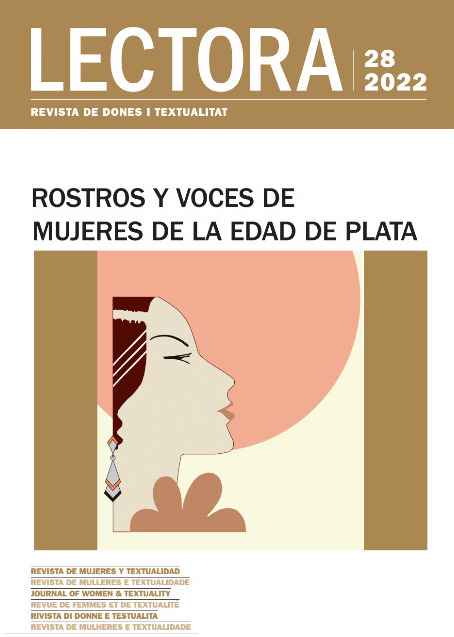¿Dónde está la llave, Matarile? Deseo y disidencia en Purita de Nazario Luque
DOI:
https://doi.org/10.1344/Lectora2022.28.19Keywords:
feminism, comic, Spanish TransitionAbstract
This article proposes an approach from the perspective of Affect Theory to the work of the Sevillian Nazario Luque, specifically to his comic Purita (1975-77), which will be contextualised within the framework of the Spanish Transition. First, I will analyse the development of underground culture and feminism, as well as their influences on the creation of an emotional community. Then, I will examine the character of Purita as an icon of her society. In this sense, the value of Nazario’s work is notable; his creation exemplifies the birth and development of a new structure of feeling. Thus, we will delve into some aspects —family, society, and sexuality— in order to articulate Nazario’s vision in the sensitive period of pre-democratic Spain.
References
Ahmed, Sara (2010), "Happy Objects", The Affect Theory Reader, Melissa Gregg y Gregory J. Seigworth (eds.), Durham, Duke UP.
—(2017), La política cultural de las emociones, México, Centro de Investigaciones y Estudios de Género UNAM.
Almerini, Katia (2015), "La irrupción del feminismo en el cómic español de los setenta", Anuario del Departamento de Historia y Teoría del Arte, 27: 213-229.
Berlant, Lauren (2011), Cruel Optimism, Durham, Duke UP.
Clough, Patricia y Jean Halley (2007), The Affective Turn: Theorizing the Social, Durham, Duke UP.
Dopico, Pablo (2005), El cómic underground español, 1970-1980, Madrid, Cátedra.
—(2012), "Lo femenino y el sexo en el underground español", Revista de estudios sobre la historieta: “HISTORIETAS”, 2: 90-98.
Fernández, Pura (2016), "Emotional Readings for New Interpretative Communities in the Nineteenth Century. Agustín Pérez Zaragoza’s Galería fúnebre (1831)", Engaging the Emotions in the Spanish Culture and History, Luisa Elena Delgado, Pura Fernández y Jo Labanyi (eds.), Nashville, Vanderbilt UP: 56-76.
Galiano, Iván y Fran G. Matute (2016), "Nazario: ‘No soy ni políticamente correcto ni incorrecto, lo que intento es ser coherente’", Jot Down, 24/07/2021. <https://www.jotdown.es/2016/05/nazario-no-politicamente-correcto- incorrecto-lo-intento-coherente/>
Gregg, Melissa y Gregory J. Seigworth (2010), The Affect Theory Reader, Durham, Duke UP.
Huyssen, Andreas (2002), Después de la gran división: modernismo, cultura de masas, posmodernismo, Buenos Aires, Adriana Hidalgo editora.
Illouz, Eva (2007), Intimidades congeladas: las emociones en el capitalismo, Madrid, Katz.
Kleinman, Arthur, Veena Das y Margaret Lock (1997), Social Suffering, Berkeley, University of California Press.
Labrador Méndez, Germán (2020), "Una urna puede ser el mejor preservativo", Mélanges de la Casa de Velázquez, 50-1, 24/07/2021. <https://doi.org/10.4000/mcv.12191>
Lara, Alí y Enciso Domínguez, Giazú (2013), "El Giro Afectivo", Athenea Digital, 13 (3): 101-119, 24/07/2021. <https://atheneadigital.net/article/view/v13-n3-lara- enciso/0>
Luque, Nazario (1981), Historietas. Obra completa (1975-1980), Barcelona, La Cúpula.
—(2016), La vida cotidiana del dibujante underground, Barcelona, Anagrama.
—(2018). Sevilla y la Casita de las Pirañas, Barcelona, Anagrama.
Massumi, Brian (2015), Politics of Affect, Cambridge, Polity Press.
McCloud, Scott (2009), Entender el cómic: el arte invisible, Bilbao, Astiberri.
—(1995), Cómo se hace un cómic: el arte invisible, Barcelona, Ediciones B.
Monge Blanco, Azucena (2016), Autoras en el boom del cómic adulto. Cómic feminista en la Historieta española (1975-1984), Universidad del País Vasco, Archivo Digital para la Docencia y la Investigación.
Morán, Gregorio (2015), El precio de la transición, Madrid, Ediciones Akal.
Pérez del Solar, Pedro (2013), Imágenes del desencanto: nueva historieta española 1980- 1986, Madrid, Iberoamericana. Probyn, Elspeth (2010), "Writing Shame", The Affect Theory Reader, Melissa Gregg y Gregory J. Seigworth (eds.), Durham, Duke UP.
Tapia, Asier y Miguel Hernández (2013), "Movimientos sociales en España de la Transición hasta nuestros días: ¿Por un cambio del sistema o por un cambio en el sistema?", Ciudad Paz-Ando, 6 (2): 48-63.
Vasileva, Aneta (2016), "Autoras en el boom del cómic adulto: cómic feminista en la Historieta Española (1975-1984)", Battles of the Comic. Perspectives on Contemporary Graphic Narrative, Javier Lluch-Prats, José Martínez Rubio y Luz C. Souto (eds.), Valencia, Universitat de València, Diablotexto Digital: 319-340.
Williams, Raymond (2000), Marxismo y literatura, Barcelona, Ediciones Península.
Downloads
Published
How to Cite
Issue
Section
License
The Author retains ownership of the copyright in this article and grants Lectora: revista de dones i textualitat the rights to print publication of the Article. The work will be available under a Creative Commons Attribution-Noncommercial-No Derivative Works license, by which the article must be credited to the Author and the Journal be credited as first place of publication.
The Author is free to enter in seperate, additional contractual agreements for the non-exclusive distribution of the work as published in this journal (such as institutional repositories or a book), as long as the original publication in Lectora is credited.
The Author is encouraged to post the work online (eg in institutional or thematic repositories, or in their website), as it can lead to productive exchanges as well as to a greater citation of the published work (see The Effect of Open Access).




